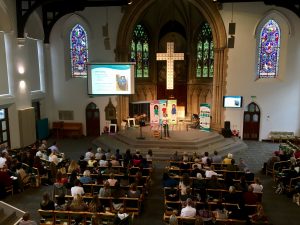Jen Thomson: How do adult stroke survivors with asphasia want to use their time outside of therapy on a stroke rehabilitation unit to support their own recovery
“The small award scheme has allowed me to continue to be research active after and in between formal research qualification training. It has enabled research activity into an important clinical aspect that would not have been possible without its support.”
Research Details
Name
Jen Thomson
Profession & current role
Senior Speech & Language Therapist (SLT) – Stroke Rehabilitation
Leading the SLT inpatient stroke rehabilitation unit team supporting those with communication and swallowing needs after stroke; leading a specialist outpatient service (Leeds Aphasia Technology Service) which supports people with aphasia to access technology, use existing technologies and specialist programmes/apps to improve their communication; supporting those with communication needs within the wider Adult SLT service.
Employer (at the time of the award)
Leeds Teaching Hospitals Trust
Title of study
How do adult stroke survivors with aphasia want to use their time outside of therapy on a stroke rehabilitation unit to support their own recovery?
Amount awarded
£1000
Will this research influence your future research activity?
Yes. The award allows me to build on research skills developed during my MPhil, HEE / NIHR post-masters internship and established collaboration activities, as well as developing new skills and collaborations. It will also allow me to explore the practicalities of clinical research within my current role outside of a dedicated research scheme. The research findings will help improve services on the stroke rehabilitation unit, as well as potentially highlight further aspects that require future research.
Contact Jennifer
Twitter: @JenThomsonSLT
Research Summary
Stroke research is exploring and identifying the critical components of effective and efficient hospital-based stroke rehabilitation. Identified aspects include intensity of therapy activity, creation of a stimulating and engaging ward environment and encouraging stroke survivors to guide their own recovery jointly with stroke unit staff.
Stroke survivors report, in the stroke research literature, limited opportunities to promote their own recovery along with empty and wasted time outside of therapy sessions when staying on stroke rehabilitation units. The landscape is even bleaker for stroke survivors with aphasia – a language-communication disability after damage to the brain. The majority of time outside therapy sessions for those with aphasia is spent alone, inactive and in fewer interactions/conversations than those without aphasia. Research suggests that positive initiatives e.g. development of a daily routine outside of therapy or provision ‘homework’ type activities may help recovery both during and after hospital-based rehabilitation.
This study aims to interview people with aphasia after stroke during their stay on a stroke rehabilitation unit to explore how they currently spend their time, and may wish to spend their time, outside of therapy sessions as one part of their recovery process, including their perceived benefits of doing so as well as any barriers and facilitators.
